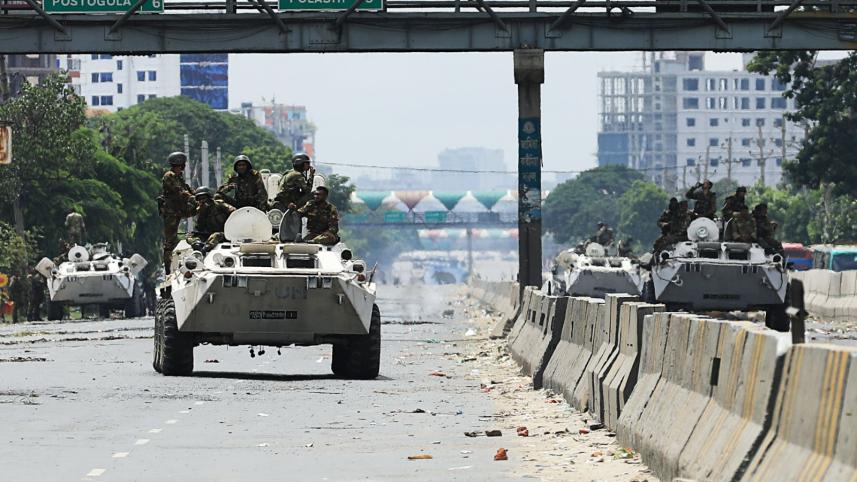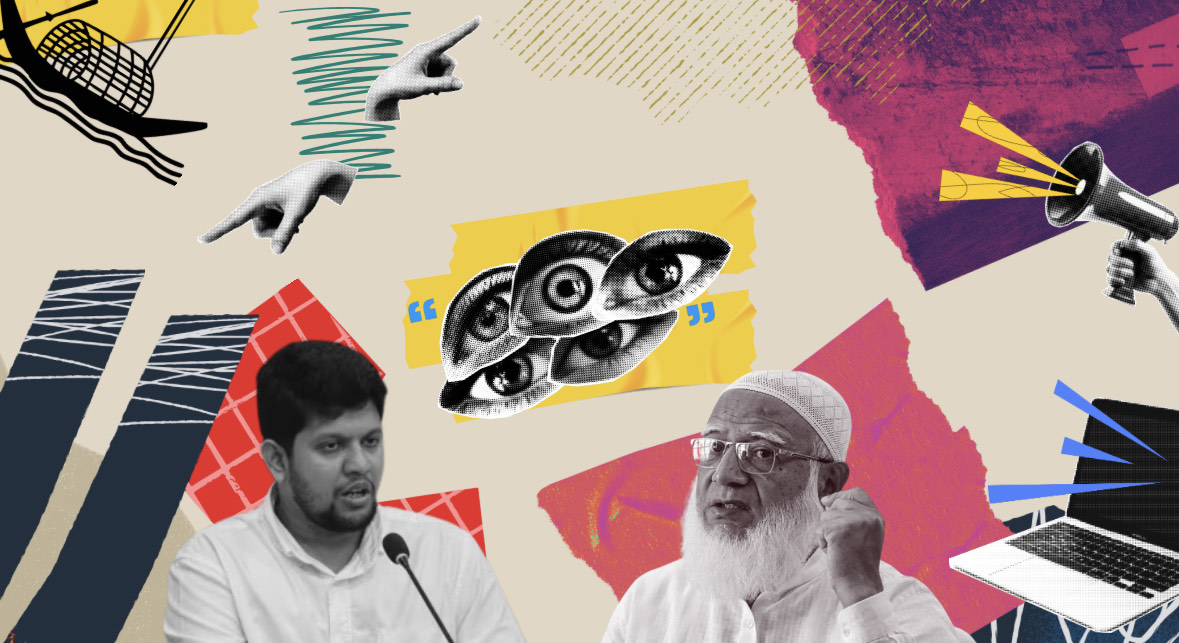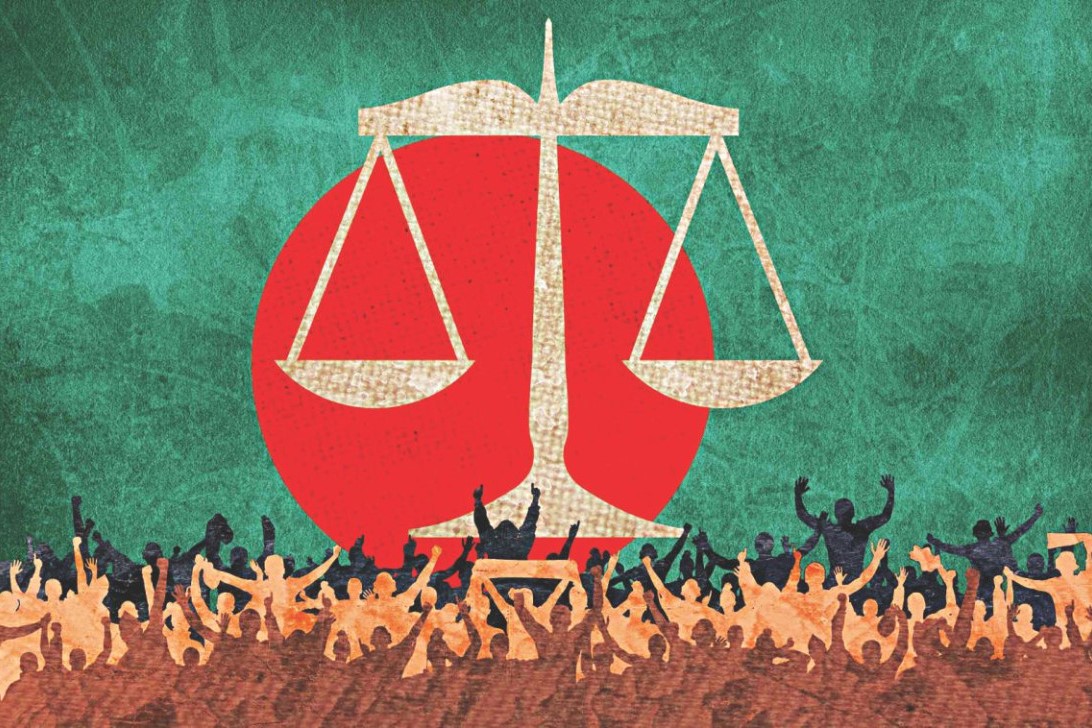Military officers, civil charges, and the future of democratic rule

In the modern international politico-security system, maintaining a balance between democracy and the military is crucial, despite the inherent tensions between democratisation and militarisation. The greater the military's interference in domestic politics, the higher the risk of democratic fragility. In developed democracies, this understanding guides the military to remain detached from political affairs while upholding national security.
The history of Bangladesh, however, is fraught with ambiguity, marked by both active and passive interventions of the military in politics, and by violent, often conflicting, relationships among political parties striving to gain or retain power. Last year, the country witnessed an unprecedented mass uprising that toppled Sheikh Hasina's 15-year-long dictatorial regime—one long perceived as supported by the military—only for the latter to ultimately realign itself with public sentiment and play a stabilising role during the transition. And recently, in another rare set of circumstances, we saw the International Crimes Tribunal (ICT) of Bangladesh bring formal charges against 25 current and former military officers in three cases for their alleged involvement in enforced disappearance, secret detention, torture, and crimes against humanity.
This marks a unique moment in our history. Since Bangladesh's independence in 1971, the armed forces have largely operated under a de facto shield of immunity from civil jurisdiction. Grave allegations were often dealt with internally, with serving officers rarely, if ever, tried in a civil court. But since the uprising, there has been tremendous pressure on the interim government to ensure justice for the crimes committed under the Hasina regime, including those involving military officers. The recent development may thus reshape perceptions of civil-military relations and how Bangladesh holds power to account. Already, the army has declared that the 15 accused serving officers were taken into custody.
But how did this development come to be, and what lessons can be drawn from it? Several factors seem to have converged to make this moment possible.
The bloody protests that ousted the Awami League government last year forced political accountability into the spotlight. On the military front, as Adjutant General Md Hakimuzzaman has affirmed at a press briefing, those accused by the ICT were charged for their actions while working at the Directorate General of Forces Intelligence (DGFI) and the Rapid Action Battalion (Rab). The accusations have not been vague. Investigations have reportedly produced credible evidence that strengthens the legal case. Victims' testimonies, secret detention facility envelopes, and the naming of specific officers reflect an evidence-based framework hard to ignore.
Since the uprising, the demand for justice and accountability has only grown louder within both civil and military circles, as well as among our international stakeholders. The UN report on atrocities committed during the uprising also called for ensuring accountability of the members of security agencies. The report also recommended disbanding Rab and restricting the functions of the Border Guard Bangladesh (BGB) and the DGFI. These recommendations were part of efforts to address and slow the pace of the "militarisation of policing".
Amid national and international pressure, and after prolonged hesitation by the military to investigate the alleged secret underground detention centres, the authorities eventually launched an inquiry with spot visits (although both investigators and victims reported tampering and destruction of evidence). Equally importantly, a documentary released by the Chief Adviser's Office—revealing the involvement of certain military officers in acts of torture, maiming, and enforced disappearances of both civilians and soldiers—has opened a crucial space for justice through ICT charges.
Finally, alongside the armed forces' positive gestures towards justice, a recent amendment to the ICT Act—barring individuals formally charged from holding public office or government service—reflected the government's commitment to ensuring that formal charges have real and enforceable consequences.
The challenge now lies in ensuring that the trials are fair and any reform of the security agencies is enduring. Otherwise, those may backfire, portraying the system as biased and eroding trust in justice. Bangladesh's long journey towards democratic governance has often been hindered by the politics of vengeance and the uneasy balance between force and law. Yet, by bringing military officers under civil legal accountability, the nation signals that its institutions are maturing. The road ahead, however, is difficult. The temptation to misuse power is still a serious concern. If Bangladesh learns from this moment, it can strengthen civilian control, build a more professional and rights-respecting military, and develop a judiciary that commands legitimacy and trust. If not, this episode risks becoming a historical footnote—another unfulfilled promise.
The lessons here are not only for the military or a single government, but for the entire nation. Let us hope this chapter is remembered not merely for its accusations, but for genuine justice, meaningful reforms, and a renewed faith in the rule of law. Ultimately, without a whole-of-society consensus—especially among political parties, civil society, religious groups, and the media—the goal of sustainable democracy will remain elusive. The police and other civilian institutions must be both empowered and held accountable so that the state does not routinely rely on the armed forces and intelligence agencies in civil matters. Such reforms would reduce dependency and potential abuse of power. But if mishandled, this moment will only revive old fears of impunity and democratic fragility.
Dr Sazzad Siddiqui is associate professor and acting chairman at the Department of Peace and Conflict Studies, Dhaka University. He can be reached at sazzadhsiddiqui@du.ac.bd.
Views expressed in this article are the author's own.
Follow The Daily Star Opinion on Facebook for the latest opinions, commentaries and analyses by experts and professionals. To contribute your article or letter to The Daily Star Opinion, see our guidelines for submission.

 For all latest news, follow The Daily Star's Google News channel.
For all latest news, follow The Daily Star's Google News channel. 

Comments